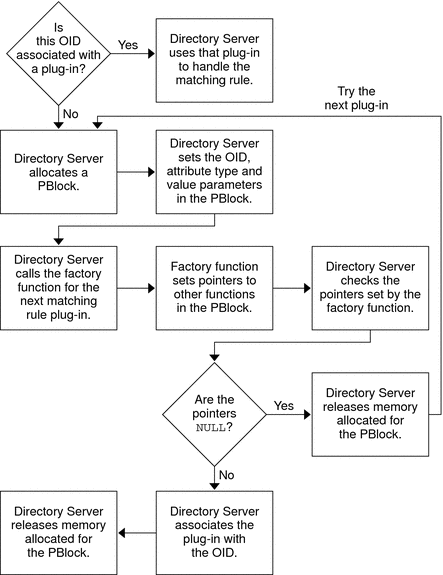Handling an Unknown Matching Rule
This section explains how Directory Server finds a plug-in for a matching rule OID not recognized by that Directory Server.
Internal List of Correspondences
Directory Server identifies matching rules by OID. The server keeps an internal list of which matching rule plug-ins handle which OIDs.
Directory Server uses the internal list to determine which plug-in to call when the server receives an extensible match filter search request that includes a matching rule OID. Directory Server initially builds the list as matching rule plug-ins register OIDs that the plug-ins handle using slapi_matchingrule_register() in the plug-in initialization function.
OIDs Not in the Internal List
When the server encounters a matching rule OID that is not in the list, Directory Server queries each matching rule plug-in through registered factory functions. For every matching rule plug-in, Directory Server passes a parameter block that contains the OID to the matching rule factory function. The server then checks whether the factory function has in return provided a pointer in the parameter block. This pointer identifies the appropriate indexing or matching function for the OID.
If the factory function sets a pointer to the appropriate function, Directory Server assumes that the plug-in supports the matching rule.
The following shows how Directory Server checks whether a plug-in handles a specific filter match operation. The process for indexing closely resembles the process for matching.
Figure 11–7 Finding a Matching Rule Plug-In for an Unknown OID

-
Directory Server finds no match in the internal list of plug-ins to handle the OID. The server therefore creates a parameter block, and sets appropriate parameters for the factory, including SLAPI_PLUGIN_MR_OID.
-
Directory Server calls the factory function. The factory function either sets a pointer in the parameter block to the appropriate function to handle the matching rule, or the function leaves the pointer NULL.
-
Directory Server checks the parameter block after the factory function returns. If the factory function has set a function pointer in the parameter block, Directory Server updates its internal list. The function thus indicates that the plug-in supports the matching rule operation that is associated with the OID. Otherwise, the pointer remains NULL, and Directory Server tries the process again on the next matching rule plug-in that is registered.
If after calling all matching rule plug-ins, Directory Server has found no plug-in to handle the matching rule OID, the server returns LDAP_UNAVAILABLE_CRITICAL_EXTENSION to the client.
-
Directory Server frees the memory that was allocated for the operation.
Be aware that Directory Server calls plug-in factory functions for the purpose of extending the internal list of correspondences.
The following summarizes the process shown in Figure 11–7.
- © 2010, Oracle Corporation and/or its affiliates
